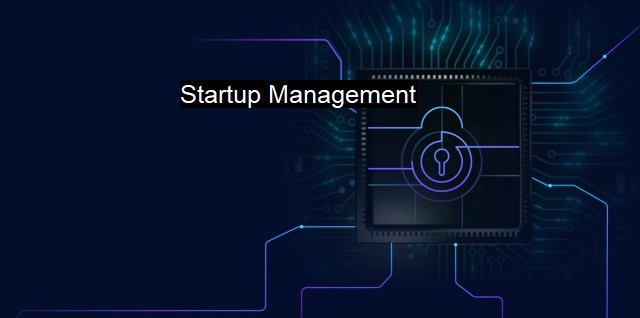What is Startup Management?
Secure Startups: Navigating Cybersecurity and Antivirus Challenges through Effective Management"
Startup management in the realm of cybersecurity and antivirus is a rapidly evolving field. startup management revolves around orchestrating and managing the growth of a new organization, or a "startup," particularly in the digital technology industry. in today's interconnected world, understanding that these new companies often deal with cyber threats is crucial. The growth of technology has also escalated the number of cyberattacks, emphasizing the importance of robust cybersecurity and antivirus protocols in startups.One of the tracking challenges in startup management is storing and securing customer data. With most startups blending technology into their operations or product line-up, it's crucial to establish formidable security systems to protect customer information. The management of cybersecurity in startups integrates strategies that safeguard against cyber threats and mitigates potential damages from breaches through antivirus software.
The first point to note is the implementation of preventative measures. The role of cybersecurity in startup management often begins with the identification of potential vulnerabilities within the company's IT infrastructure. Measures such as regular system audits, penetration testing, and security awareness training involve employees are fundamental to preempting possible cyber threats.
The use of up-to-date antivirus software to counter malicious software forms is an integral part of startup management. Fully-featured antivirus systems not only protect against known viruses but are also effective in dealing with malware, ransomware, and other sophisticated online threats. Ensuring regular updates on security systems enables startups to manage newer threats appearing daily due to the increasing complexity of cyberattacks.
Another significant aspect of startup management within the context of cybersecurity is compliance with data protection regulations. Different regions worldwide have particular laws about data handling, which are continually evolving as technology advances. Focused comprehension of these laws is crucial for startup managers to avoid substantial penalties or damage to the company's reputation that may arise from non-compliance.
Regular monitoring is also a significant aspect of startup management. This includes the monitoring of network traffic, data access logs, and physical entry points into the organization's infrastructure. By doing so, irregular activities can be noted, and immediate action taken to ensure breaches do not occur. The employment of strategies that notify administrators in real-time about any suspicious activities allows startups to appropriately manage pre-emptive and reactive measures.
INCIDENT RESPONSE PLANS
Startup management also ensures the existence of an incident response (IR) plan. This plan usually includes pre-defined actions to be taken if a cybersecurity breach does occur, thus minimizing losses and recovery time. It also consists of steps like isolating affected systems and understanding how the breach happened to prevent a recurrence.
Cybersecurity in startup management requires continuous advancements and evolution. The tactics used by cyber threat creators are becoming more refined and creative. Optimization of defenses against these threats involves continuous learning and adjusting existing measures fittingly. This involves new training methods for employees, staying updated with the latest cyber threats, and continually evaluating an organization's cybersecurity system.
A cybersecurity breach can severely impair a startup from achieving its targets, sometimes irrevocably damaging the trust of customers and stakeholders minus robust security and risk management systems. Therefore, the significance of cybersecurity and antivirus in startup management is paramount. the proper application of such measures, from applying preventative tactics to ensuring immediate incident response, protects a startup's data, satisfies customers, and successfully drives progress.

Startup Management FAQs
What is startup management in the context of cybersecurity and antivirus?
Startup management in cybersecurity refers to the process of managing the security measures that are implemented during the early stages of a new company. This process includes identifying potential cybersecurity threats and implementing antivirus software to protect the company's assets.Why is startup management important for cybersecurity and antivirus?
Startups are particularly vulnerable to cyber attacks as they may not have the resources or expertise to properly secure their systems. Startup management ensures that adequate security measures are put in place from the beginning to prevent data breaches and other cyber threats.What are some best practices for startup management in cybersecurity and antivirus?
Some best practices for startup management in cybersecurity and antivirus include conducting a thorough risk assessment, implementing strong passwords, regularly updating software and antivirus programs, and providing regular cybersecurity training to employees.Who should be responsible for startup management in cybersecurity and antivirus?
It is typically the responsibility of the startup's leadership team to ensure that proper cybersecurity measures are in place. This may include hiring a dedicated IT security professional or outsourcing to a cybersecurity firm. All employees should also be trained on cybersecurity best practices to ensure that the company remains secure.| | A | | | B | | | C | | | D | | | E | | | F | | | G | | | H | | | I | | | J | | | K | | | L | | | M | |
| | N | | | O | | | P | | | Q | | | R | | | S | | | T | | | U | | | V | | | W | | | X | | | Y | | | Z | |
| | 1 | | | 2 | | | 3 | | | 4 | | | 7 | | | 8 | | |||||||